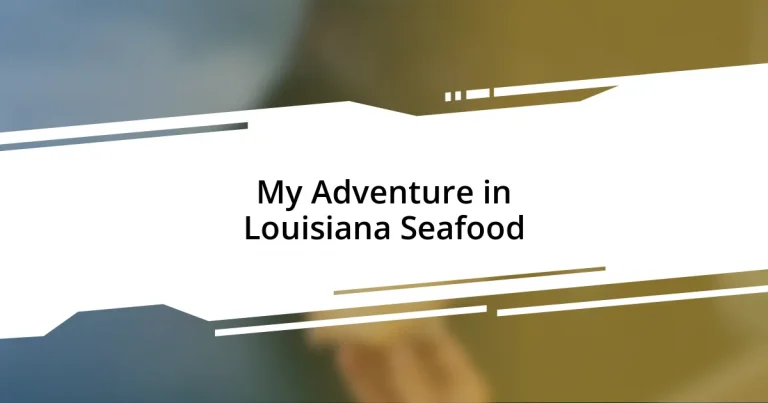Key takeaways:
- Louisiana seafood reflects a rich cultural heritage, influenced by various cuisines, and offers a unique gastronomic experience.
- Freshness is crucial in seafood quality, characterized by bright appearances, firm texture, and a clean, ocean-like smell.
- Popular seafood types in Louisiana include crawfish, oysters, Gulf shrimp, catfish, crabs, and redfish, each with its own traditions and communal significance.
- Sustainable practices in Louisiana fisheries emphasize environmental health and community connections, ensuring future generations can enjoy this culinary heritage.
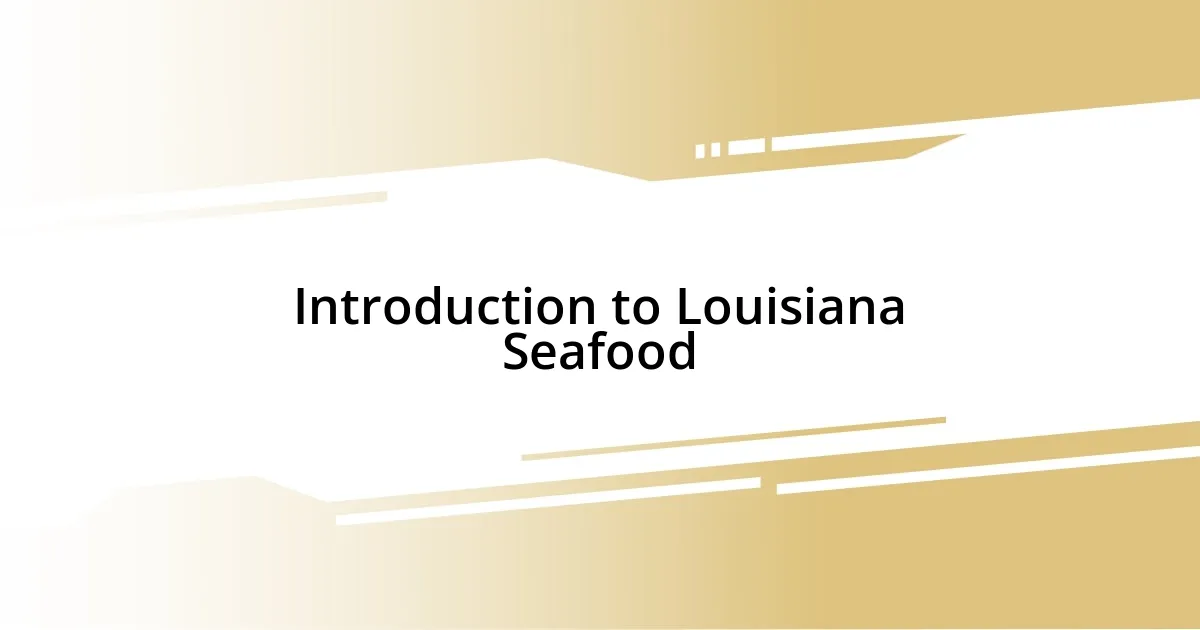
Introduction to Louisiana Seafood
Louisiana seafood is more than just a meal; it’s a vibrant tapestry of culture and tradition. I vividly remember the first time I walked into a bustling crawfish boil in the heart of New Orleans. The air was thick with the scent of spices, and the sight of friends gathered around tables overflowing with bright red crawfish sparked a warmth in my heart that still lingers.
What makes Louisiana seafood so special? The unique blend of influences—from French to African to Spanish—creates a culinary experience that’s unlike any other. Every bite of shrimp étouffée or gumbo takes me back to those sun-drenched afternoons, where the flavors tell stories of the land and its people.
Each seafood dish in Louisiana carries its own history and tradition. I’ve tasted oysters harvested straight from the Gulf, their briny essence connecting me to the waters that brought them forth. Have you ever experienced a meal that brings you closer to a place? That’s the magic of Louisiana seafood; it’s not just food, it’s a journey through time and flavors.

Assessing Seafood Quality
When assessing seafood quality, freshness is paramount. I remember visiting a local fish market early one morning, where the vibrant colors of freshly caught shrimp and fish told a story of the day’s bounty. I could immediately sense the difference; the shimmering scales on the fish and the sweet, briny aroma of the shrimp captivated me. Fresh seafood should also exhibit a firm texture, making it easier to distinguish it from older products that can feel mushy or lackluster.
One intriguing aspect of seafood quality is the inspection of its eyes. I always look for bright, clear eyes when choosing fish, as they indicate freshness. Dull or sunken eyes can spell trouble. Additionally, the smell should be clean and reminiscent of the sea, rather than fishy or sour. It’s an experience that feels almost like a ritual, selecting the best catches while engaging with local fishermen who are passionate about their craft.
To help visualize the key attributes of seafood quality, here’s a useful comparison table:
| Quality Attribute | Indicators of Freshness |
|---|---|
| Appearance | Bright, shiny skin; clear eyes |
| Texture | Firm and springy |
| Smell | Clean, ocean-like scent |
| Color | Vibrant, natural hues |
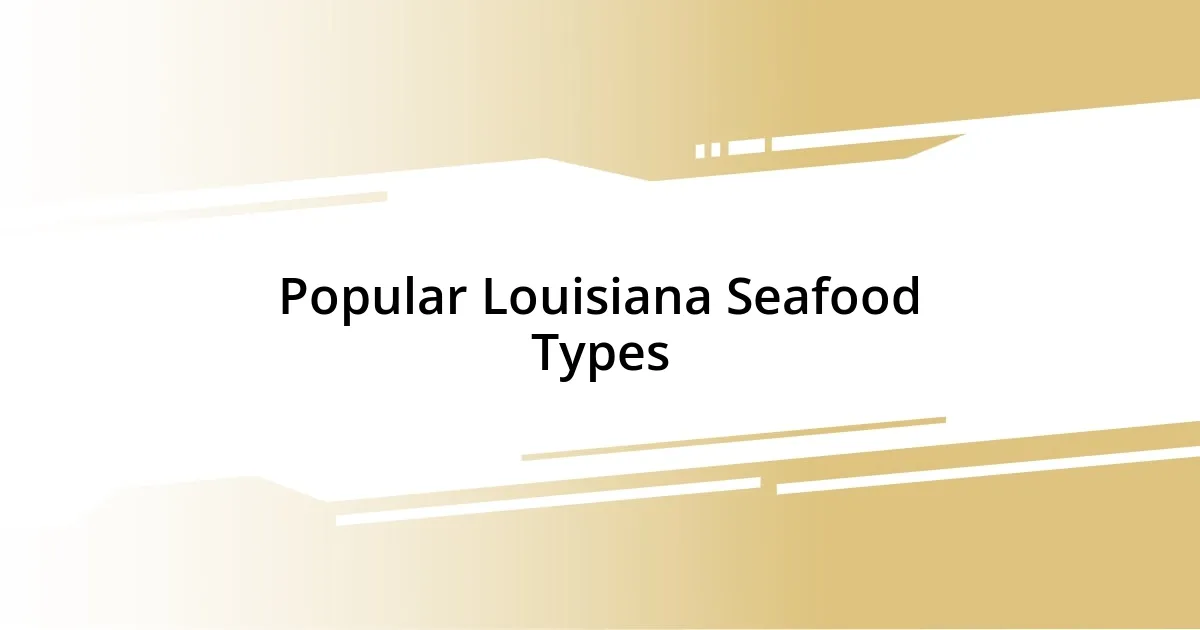
Popular Louisiana Seafood Types
Louisiana boasts a stunning variety of seafood, each type bursting with its own unique flavors and stories. The moment I tasted freshly caught shrimp at a backyard boil, I was hooked—not just on the taste but on the sheer joy shared among friends and family. It’s this connection that makes each species so special, drawing people together over plates piled high with deliciousness.
Here are some popular seafood types from Louisiana:
- Crawfish: Often celebrated during spring, these little crustaceans are boiled with spices and vegetables, creating a feast that’s both flavorful and fun.
- Oysters: Served raw on the half shell or cooked in rich dishes, Louisiana oysters are known for their brininess and are a staple in many coastal restaurants.
- Gulf Shrimp: Sweet, tender, and versatile, Gulf shrimp can be found in everything from gumbo to shrimp and grits.
- Catfish: Recognized for its mild flavor, this freshwater fish is commonly fried and served with a side of tangy tartar sauce.
- Crabs: Whether blue or soft-shell, crabs are often boiled, seasoned with Cajun spices, and enjoyed in savory dishes or simply with a mallet and newspaper spread.
- Redfish: This prized catch is grilled, blackened, or served in a rich sauce, showcasing the essence of Louisiana’s culinary creativity.
Each of these seafood types plays a crucial role in Louisiana’s cuisine, intertwining culture and community. One delightful evening, I relished a rich gumbo filled with tender chunks of catfish from a local home cook. The understated warmth and depth of flavors transported me, and in that moment, I felt the spirit of Louisiana wrapped around me.
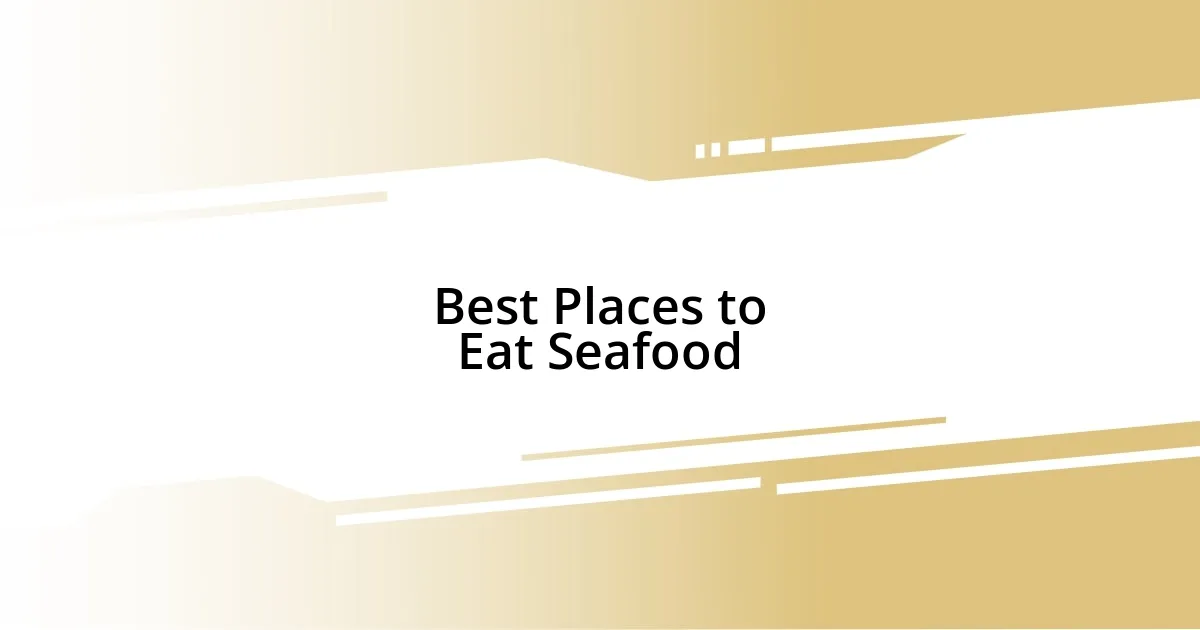
Best Places to Eat Seafood
When it comes to savoring seafood in Louisiana, one standout spot is the Acme Oyster House in New Orleans. I can still remember my first visit there—the lively atmosphere, the smell of garlic and butter wafting through the air as I indulged in fresh oysters on the half shell. Each bite was a burst of briny goodness that made me feel so connected to the Gulf waters. Can you imagine sharing a plate of oysters with friends, laughing as you all try different preparations? That’s the magic of this place.
Another gem is Crawfish Town USA in Henderson, where the experience of a crawfish boil can’t be matched. I recall sitting at a large picnic table, surrounded by a kaleidoscope of colors from the spicy crawfish, corn, and potatoes. The joy was palpable as we peeled and shared, making a delicious mess. It’s more than just a meal—it’s a lively gathering that fosters camaraderie and celebration. How often do you find yourself in a moment where the food brings everyone together like that?
Lastly, don’t overlook Tony’s Seafood Market in Baton Rouge. This spot isn’t just a market; it’s a treasure trove of local seafood delights. I vividly remember perusing their vast selection, feeling like a kid in a candy store, with an assortment of fresh shrimp, crab, and fish all around me. The owner, a seasoned fisherman himself, shared stories behind the catches of the day. It’s a reminder that in every bite of seafood, there’s a story—a connection to the waters and the people who bring this breathtaking cuisine to life. Isn’t it reassuring to know that when you’re enjoying seafood here, you’re participating in a rich tradition that stretches far beyond just eating?
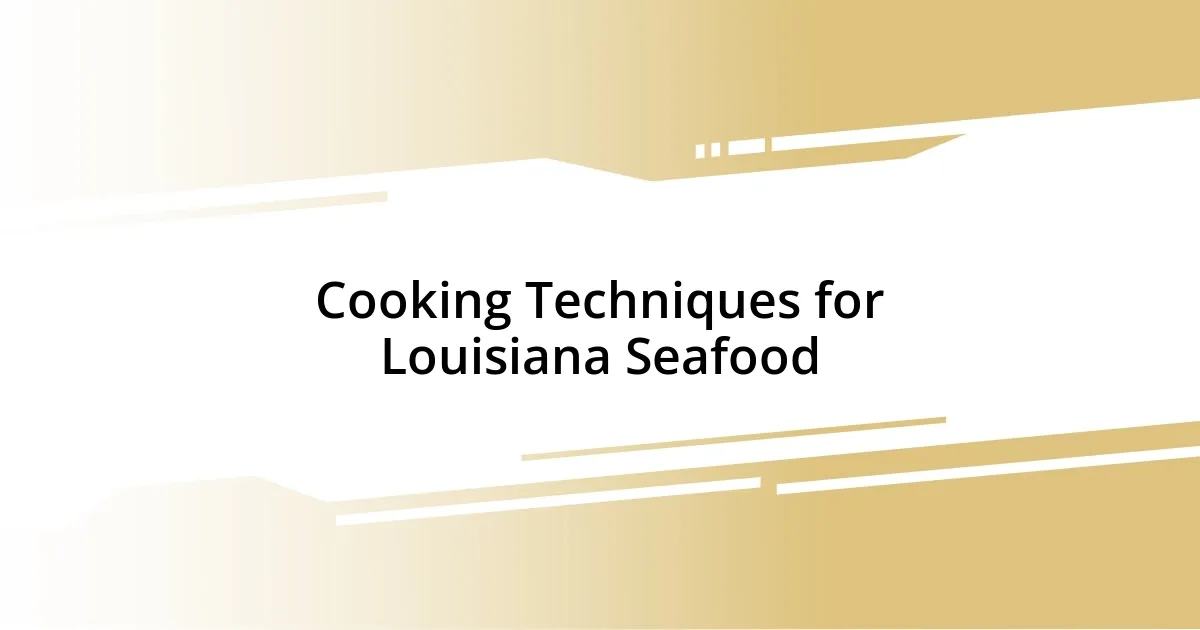
Cooking Techniques for Louisiana Seafood
Cooking seafood in Louisiana isn’t just about the techniques; it’s about embracing the flavors and traditions that have been passed down through generations. For instance, when I first tried my hand at frying catfish, I was amazed at how a simple buttermilk marinade transformed the fish into something truly special. The crunch of the coating paired with the tender fish is hard to beat. Have you ever experienced that perfect balance of crispy and flaky? It’s a culinary magic that makes every bite memorable.
I remember attending a crawfish boil where the entire process felt like an interactive feast. The crawfish, boiled to perfection with a blend of spices, created a beautiful explosion of flavor with each bite. The way they are seasoned and served—the bright reds and yellows of the spices against the vibrant crawfish—adds a visual feast to the experience. It’s an event that encourages laughter and storytelling as everyone dives in, working together to peel and enjoy. There’s something incredibly rewarding about sharing that experience, don’t you think?
Grilling redfish is another technique that resonates deeply with me. The smoky aroma that fills the air while the fish cooks over open flames is irresistible. It brings me back to sun-soaked afternoons by the bayou, where the sound of laughter mingles with the crackling of the grill. I often infuse the fish with citrus and herbs, letting the flavors meld together, and it feels like a celebration of Louisiana’s fresh produce. Every time I grill redfish, I feel the spirit of the region captured in those flavors. What’s your favorite seafood preparation that reminds you of home?
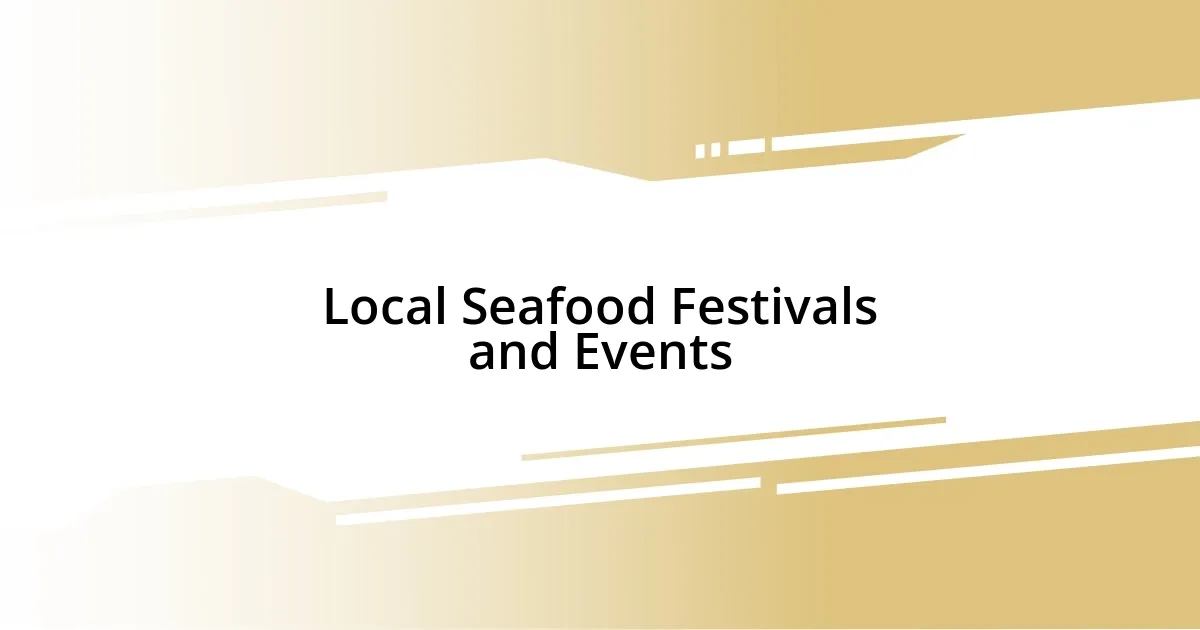
Local Seafood Festivals and Events
Attending the Louisiana Seafood Festival in New Orleans is like stepping into a colorful tapestry of flavors and community. I remember the thrill of wandering from booth to booth, sampling spicy jambalaya and savory seafood gumbo, and feeling a sense of belonging as I chatted with fellow seafood lovers. It’s more than just tasting delicious food; it’s a celebration of culture that brings people together. Have you ever been part of such an event where the food becomes a way to connect with others?
The **Crawfish Festival** in Breaux Bridge holds a special place in my heart. I’ll never forget the vibrant music filling the air, mingling with the enticing aromas of crawfish boiling nearby. I can still picture friends and families gathered around tables, chitchatting and picking at mountains of crawfish, all while the laughter and chatter create an infectious atmosphere. It’s these simple pleasures that make such festivals unforgettable, don’t you think?
Then, there’s the enchanting atmosphere of the **Louisiana Shrimp and Petroleum Festival** in Morgan City. I was struck by the juxtaposition of seafood and local industry, reflecting the community’s spirit. I distinctly remember live music and spirited competitions—for instance, the shrimp peeling contest—where participants pushed their skills to the limit. Watching the excitement and camaraderie unfold reminded me that these events celebrate not just food, but also the hard work that goes into sourcing it. Isn’t it incredible to experience the combination of skill and culinary delight in such a setting?
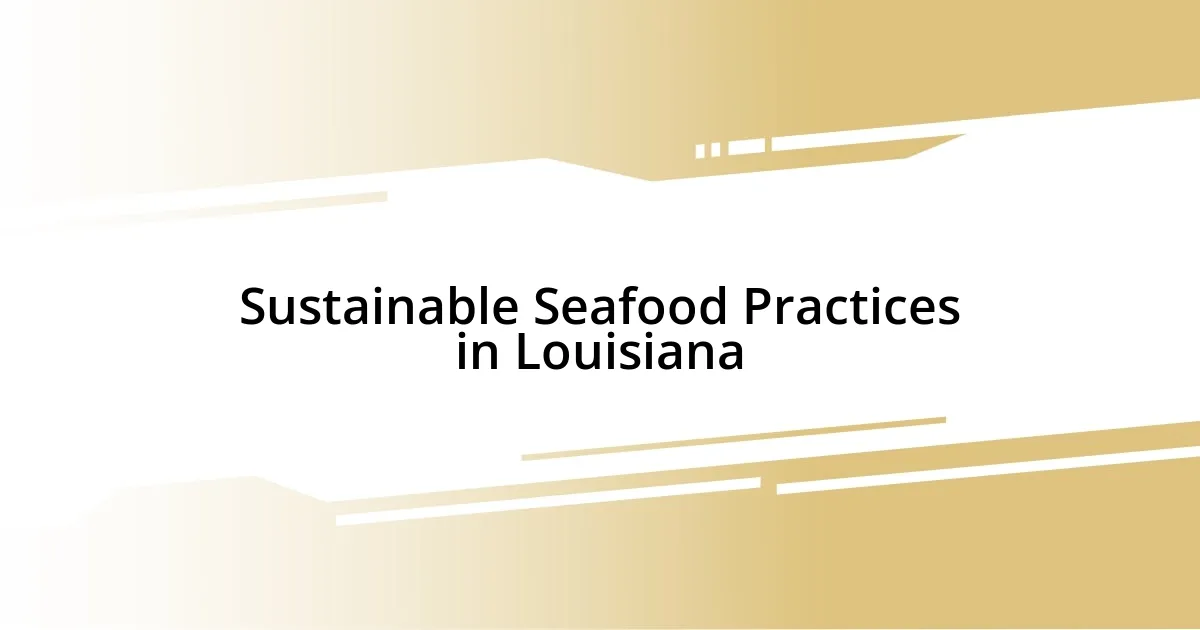
Sustainable Seafood Practices in Louisiana
Sustainable seafood practices in Louisiana are deeply rooted in the community’s love for its waterways and the need to protect them. I once took a tour of a local fishery and was impressed by the cooperative efforts to maintain fish populations. It made me realize just how crucial practices like regulated catch limits and seasonal fishing are to preserving the bounty for future generations. Have you ever thought about where your seafood comes from and how it’s sourced?
I’ve also had the pleasure of visiting a hatchery that focuses on breeding shrimp and fish in a sustainable manner. Watching the small, carefully nurtured fry grow into healthy adults truly highlighted the commitment to not only flavor but also environmental health. The passion of the staff was infectious; they genuinely care about ensuring that future generations can enjoy the rich seafood culture that Louisiana is famous for. How often do we consider the people behind the products we love?
Furthermore, community-supported fisheries (CSFs) are gaining momentum across Louisiana, connecting local fishermen directly with consumers. I remember picking up my first CSF box and feeling an overwhelming sense of gratitude for the hard work that goes into each catch. The freshness of the seafood was unlike anything else, and knowing that I was supporting local livelihoods added an extra layer of satisfaction to every meal. Doesn’t it feel good to know your choices are making a positive impact?












